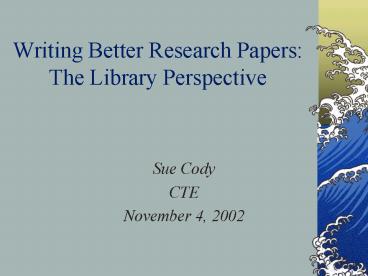Writing Better Research Papers: The Library Perspective - PowerPoint PPT Presentation
1 / 23
Title:
Writing Better Research Papers: The Library Perspective
Description:
The Nature of Research & Writing. Fluid and organic, not simply sequential ... We all do have one thing in common: We procrastinate! Scholar's Research Model ... – PowerPoint PPT presentation
Number of Views:43
Avg rating:3.0/5.0
Title: Writing Better Research Papers: The Library Perspective
1
Writing Better Research Papers The Library
Perspective
- Sue Cody
- CTE
- November 4, 2002
2
The Nature of Research Writing
- Fluid and organic, not simply sequential
- Alternate searching writing
- Read Write Reflect Discuss Read. . .
- Research is a social act
- Confer with scholars and other experts
- Through writing, we learn what we know what we
want to know
3
Reality Check
- Students dont do research in the same manner as
either scholars or librarians! - Searching for information has never been easier
nor as complex. - We all do have one thing in common
We procrastinate!
4
Scholars Research Model
- Connections and critical judgments are second
nature - Prefer footnotes and personal contacts to access
literature (databases) - Time for serendipitous discovery browsing
- Ideas spring from curiosity awareness
5
Librarians Search Strategy
- Systematic, Tool-based
- Start with general background information
- Overview, vocabulary, names, dates, key issues
- Monographic Sources
- Online Catalog
- WorldCat
- Periodical Articles
- Full-text databases
- Specialized abstracts indexes
6
Footnotes vs. Access Literature
- Citations in context
- Integrate disciplines
- Quality assessment by experts
- Filtered through arbitrary sets of descriptors
- May be limited by discipline
- Limited quality assessment
7
Scholar-Librarian Differences
- Scholar
- Quest for knowledge
- Context and methodology of the discipline is
unique - Complex personal
- Gather original data
- Library resources are just one aspect
- Librarian
- Search for information
- Basic search strategy applied to all disciplines
- More mechanistic
- Based upon gathering and synthesizing existing
information
8
Student Characteristics
- Lack of knowledge theories, context,
methodologies authorities in the discipline - Filled with self-doubt and troubled by ambiguity
and conflicting opinions - Projects are time-limited
- Interest level may not be high
9
Student Challenges
- Understanding the purpose of the project
- Choosing and narrowing the topic
- Selecting terms for searching
- Evaluating sources
10
Students Topic Selection
- Finding a research focus is challenging and time
consuming - Build on existing interest/knowledge
- Confer with instructor, instructor referral
- Browse shelves and scan indexes
- Recognize this part takes time!
11
Students Searching Challenges
- Serendipity without context Haphazard,
unplanned searching - Translating topics into search terms
- Information excess Intellectual distress
- Unaware of information organization
- Deadline First out, all done
12
Students Issues in Evaluating
- Tempted to discard dissenting views
- Full text availability time cost effective,
but are they the best? - Popular vs. scholarly peer reviewed
- Choose most familiar sources
13
Synthesizing
- Traditional outline may be too linear discovery
in progress - Wheel or web may be a better arrangement
- Ask questions to organize the topic
14
What is needed?
- Partnership
- Instructor provides subject knowledge and
direction - Librarian demonstrates bibliographic skills
15
Library Services
- Assignment Assistance
- Collection Development
- Instructional Sessions
- Web-based Assignment Guides
- Subject Resource Web Pages
- Reference Assistance
16
Assignment Assistance
- Consult with library liaison or reference
librarian to achieve learning objectives - Consider advice at http//library.uncwil.edu/is/e
ffective.html
17
Collection Development
- Library Rep and Library Liaison
- Plan ahead for special topics courses
- Projects fund
- Collaborate with librarian to identify items
- Bibliographies
- Books in some databases, e.g., PsycInfo, MLA
- Book reviews
18
Instructional sessions
- Hands-on in library classroom (20 PCs)
- Tailored to assignment
- Searching and evaluating sources
- Scheduling issues
- One room available
- Timing with assignment
- Session as dialog or team-teaching
19
Web-based assignment guides
- Accompany BI session or stand alone
- Include direct links to online resources
- Include call numbers for paper resources
- Current guides on Instruction Web page links to
previous guides
20
Subject Resource Web Pages
- Correspond to academic departments
- Quick links to best databases
- Comprehensive list of databases
- Selected Internet Resources
- E-Journals
- Guides
- Citing Resources
21
Reference Assistance
- One-on-one on demand (Just Ask!)
- Ask a Librarian (e-mail, Web-based)
- Drop-In Clinics or Class Work Sessions
- Reference by appointment, e.g., STAR
22
Summary Advice
- Ask students to scan the literature before making
their topic choice - Provide a mechanism for early guidance
- Break project into sub-projects
- Preliminary bibliography
- Sections turned in over time
- Revisions
23
Summary Advice
- Be very clear about what you want tell students
and librarians - Confer with librarians about assignments
- Send a copy of the assignment to the Reference
Desk (libref_at_uncw.edu) - Consider scheduling at least one session of
library instruction - Refer students to drop-in clinics































